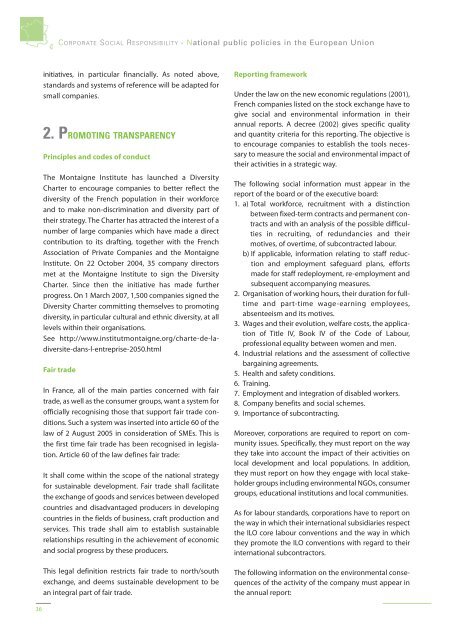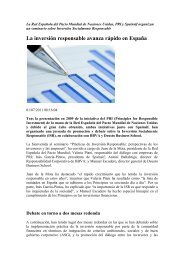Corporate Social Responsibility National public policies in the ...
Corporate Social Responsibility National public policies in the ...
Corporate Social Responsibility National public policies in the ...
You also want an ePaper? Increase the reach of your titles
YUMPU automatically turns print PDFs into web optimized ePapers that Google loves.
CORPORATE SOCIAL RESPONSIBILITY - <strong>National</strong> <strong>public</strong> <strong>policies</strong> <strong>in</strong> <strong>the</strong> European Union<br />
<strong>in</strong>itiatives, <strong>in</strong> particular f<strong>in</strong>ancially. As noted above,<br />
standards and systems of reference will be adapted for<br />
small companies.<br />
2. PROMOTING TRANSPARENCY<br />
Pr<strong>in</strong>ciples and codes of conduct<br />
The Montaigne Institute has launched a Diversity<br />
Charter to encourage companies to better reflect <strong>the</strong><br />
diversity of <strong>the</strong> French population <strong>in</strong> <strong>the</strong>ir workforce<br />
and to make non-discrim<strong>in</strong>ation and diversity part of<br />
<strong>the</strong>ir strategy. The Charter has attracted <strong>the</strong> <strong>in</strong>terest of a<br />
number of large companies which have made a direct<br />
contribution to its draft<strong>in</strong>g, toge<strong>the</strong>r with <strong>the</strong> French<br />
Association of Private Companies and <strong>the</strong> Montaigne<br />
Institute. On 22 October 2004, 5 company directors<br />
met at <strong>the</strong> Montaigne Institute to sign <strong>the</strong> Diversity<br />
Charter. S<strong>in</strong>ce <strong>the</strong>n <strong>the</strong> <strong>in</strong>itiative has made fur<strong>the</strong>r<br />
progress. On 1 March 2007, 1,500 companies signed <strong>the</strong><br />
Diversity Charter committ<strong>in</strong>g <strong>the</strong>mselves to promot<strong>in</strong>g<br />
diversity, <strong>in</strong> particular cultural and ethnic diversity, at all<br />
levels with<strong>in</strong> <strong>the</strong>ir organisations.<br />
See http://www.<strong>in</strong>stitutmontaigne.org/charte-de-ladiversite-dans-l-entreprise-2050.html<br />
Fair trade<br />
In France, all of <strong>the</strong> ma<strong>in</strong> parties concerned with fair<br />
trade, as well as <strong>the</strong> consumer groups, want a system for<br />
officially recognis<strong>in</strong>g those that support fair trade conditions.<br />
Such a system was <strong>in</strong>serted <strong>in</strong>to article 60 of <strong>the</strong><br />
law of 2 August 2005 <strong>in</strong> consideration of SMEs. This is<br />
<strong>the</strong> first time fair trade has been recognised <strong>in</strong> legislation.<br />
Article 60 of <strong>the</strong> law def<strong>in</strong>es fair trade:<br />
It shall come with<strong>in</strong> <strong>the</strong> scope of <strong>the</strong> national strategy<br />
for susta<strong>in</strong>able development. Fair trade shall facilitate<br />
<strong>the</strong> exchange of goods and services between developed<br />
countries and disadvantaged producers <strong>in</strong> develop<strong>in</strong>g<br />
countries <strong>in</strong> <strong>the</strong> fields of bus<strong>in</strong>ess, craft production and<br />
services. This trade shall aim to establish susta<strong>in</strong>able<br />
relationships result<strong>in</strong>g <strong>in</strong> <strong>the</strong> achievement of economic<br />
and social progress by <strong>the</strong>se producers.<br />
This legal def<strong>in</strong>ition restricts fair trade to north/south<br />
exchange, and deems susta<strong>in</strong>able development to be<br />
an <strong>in</strong>tegral part of fair trade.<br />
Report<strong>in</strong>g framework<br />
Under <strong>the</strong> law on <strong>the</strong> new economic regulations (2001),<br />
French companies listed on <strong>the</strong> stock exchange have to<br />
give social and environmental <strong>in</strong>formation <strong>in</strong> <strong>the</strong>ir<br />
annual reports. A decree (2002) gives specific quality<br />
and quantity criteria for this report<strong>in</strong>g. The objective is<br />
to encourage companies to establish <strong>the</strong> tools necessary<br />
to measure <strong>the</strong> social and environmental impact of<br />
<strong>the</strong>ir activities <strong>in</strong> a strategic way.<br />
The follow<strong>in</strong>g social <strong>in</strong>formation must appear <strong>in</strong> <strong>the</strong><br />
report of <strong>the</strong> board or of <strong>the</strong> executive board:<br />
1. a) Total workforce, recruitment with a dist<strong>in</strong>ction<br />
between fixed-term contracts and permanent contracts<br />
and with an analysis of <strong>the</strong> possible difficulties<br />
<strong>in</strong> recruit<strong>in</strong>g, of redundancies and <strong>the</strong>ir<br />
motives, of overtime, of subcontracted labour.<br />
b) If applicable, <strong>in</strong>formation relat<strong>in</strong>g to staff reduction<br />
and employment safeguard plans, efforts<br />
made for staff redeployment, re-employment and<br />
subsequent accompany<strong>in</strong>g measures.<br />
2. Organisation of work<strong>in</strong>g hours, <strong>the</strong>ir duration for fulltime<br />
and part-time wage-earn<strong>in</strong>g employees,<br />
absenteeism and its motives.<br />
. Wages and <strong>the</strong>ir evolution, welfare costs, <strong>the</strong> application<br />
of Title IV, Book IV of <strong>the</strong> Code of Labour,<br />
professional equality between women and men.<br />
4. Industrial relations and <strong>the</strong> assessment of collective<br />
barga<strong>in</strong><strong>in</strong>g agreements.<br />
5. Health and safety conditions.<br />
6. Tra<strong>in</strong><strong>in</strong>g.<br />
7. Employment and <strong>in</strong>tegration of disabled workers.<br />
8. Company benefits and social schemes.<br />
9. Importance of subcontract<strong>in</strong>g.<br />
Moreover, corporations are required to report on community<br />
issues. Specifically, <strong>the</strong>y must report on <strong>the</strong> way<br />
<strong>the</strong>y take <strong>in</strong>to account <strong>the</strong> impact of <strong>the</strong>ir activities on<br />
local development and local populations. In addition,<br />
<strong>the</strong>y must report on how <strong>the</strong>y engage with local stakeholder<br />
groups <strong>in</strong>clud<strong>in</strong>g environmental NGOs, consumer<br />
groups, educational <strong>in</strong>stitutions and local communities.<br />
As for labour standards, corporations have to report on<br />
<strong>the</strong> way <strong>in</strong> which <strong>the</strong>ir <strong>in</strong>ternational subsidiaries respect<br />
<strong>the</strong> ILO core labour conventions and <strong>the</strong> way <strong>in</strong> which<br />
<strong>the</strong>y promote <strong>the</strong> ILO conventions with regard to <strong>the</strong>ir<br />
<strong>in</strong>ternational subcontractors.<br />
The follow<strong>in</strong>g <strong>in</strong>formation on <strong>the</strong> environmental consequences<br />
of <strong>the</strong> activity of <strong>the</strong> company must appear <strong>in</strong><br />
<strong>the</strong> annual report:<br />
6








